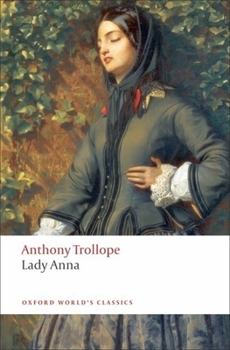Lady Anna
Select Format
Select Condition 
Book Overview
When it appeared in 1874, Lady Anna met with little success, and positively outraged the conservative - This is the sort of thing the reading public will never stand...a man must be embittered by some violent present exasperation who can like such disruptions of social order as this.' (Saturday Review) - although Trollope himself considered it the best novel I ever wrote Very much Quite far away above all others ' This tightly constructed and...
Format:Paperback
Language:English
ISBN:0199537712
ISBN13:9780199537716
Release Date:August 2009
Publisher:Oxford University Press
Length:560 Pages
Weight:3.15 lbs.
Dimensions:1.1" x 5.0" x 7.7"
Customer Reviews
2 ratings
Romance of a Real and Strange sort
Published by Thriftbooks.com User , 21 years ago
This was an interesting, if imperfect, novel of marriage. The main thrust of the novel has to do with a legal battle a COuntess and her daughter, Lady Anna, engage in to assert their legal rights after having been abused by an evil Earl, who married and abandoned the Countess. To assert these rights, a demand is made by the mother to the daughter that she wed her cousin, although no one guesses that Anna is already engaged to the poor tailor who has been her one true friend in life.I enjoyed many aspects of the novel, primarily how the mother-daughter relationship plays out. The subplot of the book is that we all must separate from Mother, and make our own way, our own decisions. This Mother is especially hard-hearted and single-minded and acts very melodramatically in one scene to the tailor (a really weird, overblown scene I could have lived without and which was incidentally, albeit unintentionally, funny). Anna herself is a character with many virtues. She Almost gives in but does not do so because she is guided by an internal voice of loyalty. Her love on the other hand is drawn realistically if not in a flattering way. Daniel is almost an anti-hero. Not entirely sympathetic, you learn to like him because he seems real. The 'triangle' between those two and Lord Lovel is well-depicted, and no character comes off as 'the baddie.'Another aspect I respected was the depiction of law, and how society restrains its denizens into conventional and superficial marriages. I disagree with the previous reviewer who said this was a light novel. I think there are very dark moments and a suspicion about the characters' motives at every turn. Yet, there is decency in many characters: Anna herself and the Solicitor-General being the obvious ones. I liked this immensely, despite it being overlong and having some over-the-top moments that did not 'go' with the rest of the novel. Still, the novel has great style.
An Incomplete Saga
Published by Thriftbooks.com User , 23 years ago
Anthony Trollope declared once that "Lady Anna" was "the best novel I ever wrote". Readers did not agree. Appearing between the masterpieces "Phineas Redux" and "The Way We Live Now", it sold poorly and has been neglected ever since. Trollope blamed this failure on his audience's objections to the heroine's choice of a husband, though similar complaints, much more vehemently expressed, had not sunk "The Small House at Allington". (There Lily Dale remains faithful to the memory of a cad, scorning the devoted attentions of a worthy suitor. Anna's wooers, by contrast, are both good men, though vastly different in rank and personality.)"Lady Anna" is, in fact, a well-knit narrative with more suspense than is usual for Trollope. Will the courts declare Anna to be Lady Anna Lovel, heiress to 35,000 pounds a year, or merely Anna Murray, a pauper? Which of her suitors, the sometimes surly tailor Daniel Thwaite or her handsome, good-natured cousin Lord Lovel, will Anna prefer? Will Daniel's political principles lead to a breach with his childhood sweetheart? Will the impoverished Lord Lovel find honorable means to support his noble rank? The plot takes surprising, if not astonishing, turns; the characterization is as deft as ever; and there is a leavening of subtle humor, such as Daniel's cross-purposes consultation with a quondam radical poet (a thinly disguised Robert Southey) who has evolved into an intractable Tory.The book's weakness is that the leading characters are, by and large, decent folk at the beginning and, except for one who falls into a state akin to madness, remain decent, if not unchanged, to the end. Conflicts end in rational compromises. Everybody eventually sees everybody else's point of view. Even the lawyers on opposite sides of Lady Anna's case get along amicably. (One solicitor does have the sense to grumble that such harmony is unprofessional.)Trollope's liking for this novel may have arisen from the fact that it is light, sunny and fresh. There may be an evil earl in the first chapter and a mad countess in the last, but how pleasant for the writer to be free for a time from the political intrigues, financial manipulations and cynical worldliness of the Palliser saga and "The Way We Live Now"! Moreover, "Lady Anna" was, in its creator's mind, only a prologue. The last paragraph promises a (never written) sequel, where the characters doubtless were intended to meet sterner challenges. There are hints that the scene would have shifted to Australia and America and that the hero's and heroine's homegrown principles were to be put to the test in those lands. Thus the author had much in view that he never disclosed to his readers, perhaps accounting for part of the discrepancy between his opinion and theirs.No one who has not read all of the Palliser and Barset novels, not to mention "The Way We Live Now", should pick up "Lady Anna". I recommend it immediately after the last-named. It will cleanse the palate and le






